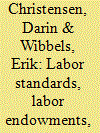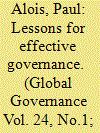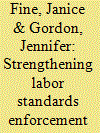|
|
|
Sort Order |
|
|
|
Items / Page
|
|
|
|
|
|
|
| Srl | Item |
| 1 |
ID:
133652


|
|
|
|
|
| Publication |
2014.
|
| Summary/Abstract |
Proponents often recommend high labor standards as a means of reducing inequality between and within countries. Opponents suggest that labor standards exacerbate international and domestic inequalities. In this paper, we forward a simple argument whereby the impact of higher labor standards on domestic inequality depends on a country's labor endowment. We hypothesize that where labor is abundant, higher standards will exacerbate inequality. Where labor is scarce, higher labor standards might lower inequality. In both cases, the impact of labor standards on inequality work through an employment and wage effect. Using newly available data on labor standards around the world from 1981 to 2000, we provide evidence largely consistent with our hypotheses. Higher labor standards do, indeed, exacerbate inequality in labor-abundant economies. On the other hand, higher labor standards lower inequality in labor-scarce economies. We discuss the implications of these findings for work on labor market insiders and outsiders as well as the political economy of development.
|
|
|
|
|
|
|
|
|
|
|
|
|
|
|
|
| 2 |
ID:
157936


|
|
|
|
|
| Summary/Abstract |
Recent decades have seen a proliferation of global multistakeholder initiatives that address “problems without passports,” but the effectiveness of these initiatives is debatable. This article discusses Better Work, an initiative that improves labor standards in the garment industry. It provides an overview of the program and discusses five lessons from Better Work that can be applied to other initiatives. These are: cooperation can be more effective than coercion; training complements the application of incentives; local ownership is critical for global initiatives; international organizations can anchor initiatives to prevent capture by powerful stakeholders; and multinational corporations can be responsible partners, but should not play a leading role.
|
|
|
|
|
|
|
|
|
|
|
|
|
|
|
|
| 3 |
ID:
099884


|
|
|
|
|
| Publication |
2010.
|
| Summary/Abstract |
Structures of employment in low-wage industries, a diminished wage and hour inspectorate, and an unworkable immigration regime have combined to create an environment where violations of basic workplace laws are everyday occurrences. This article identifies four "logics" of detection and enforcement, arguing that there is a mismatch between the enforcement strategies of most federal and state labor inspectorates and the industries in which noncompliance continues to be a problem. In response, the authors propose augmenting labor inspectorates by giving public interest groups like unions and worker centers a formal, ongoing role in enforcement in low-wage sectors. In three case studies, the authors present evidence of an emergent system-one that harkens back to a logic proposed by the drafters of the Fair Labor Standards Act (FLSA) but never implemented-of empowering those closest to the action to work in partnership with government.
|
|
|
|
|
|
|
|
|
|
|
|
|
|
|
|
| 4 |
ID:
090901


|
|
|
|
|
| Publication |
2009.
|
| Summary/Abstract |
Private, voluntary compliance programs, promoted by global corporations and nongovernmental organizations alike, have produced only modest and uneven improvements in working conditions and labor rights in most global supply chains. Through a detailed study of a major global apparel company and its suppliers, this article argues that this compliance model rests on misguided theoretical and empirical assumptions concerning the power of multinational corporations in global supply chains, the role information (derived from factory audits) plays in shaping the behavior of key actors (e.g., global brands, transnational activist networks, suppliers, purchasing agents, etc.) in these production networks, and the appropriate incentives required to change behavior and promote improvements in labor standards in these emergent centers of global production. The authors argue that it is precisely these faulty assumptions and the way they have come to shape various labor compliance initiatives throughout the world-even more than a lack of commitment, resources, or transparency by global brands and their suppliers to these programs-that explain why this compliance-focused model of private voluntary regulation has not succeeded. In contrast, this article documents that a more commitment-oriented approach to improving labor standards coexists and, in many of the same factories, complements the traditional compliance model. This commitment-oriented approach, based on joint problem solving, information exchange, and the diffusion of best practices, is often obscured by the debates over traditional compliance programs but exists in myriad factories throughout the world and has led to sustained improvements in working conditions and labor rights at these workplaces.
|
|
|
|
|
|
|
|
|
|
|
|
|
|
|
|
|
|
|
|
|